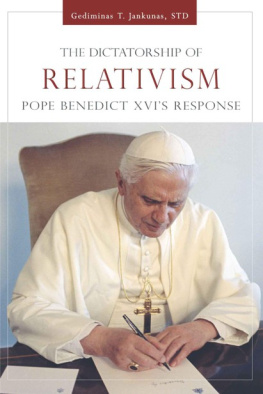Gediminas T. Jankunas - The Dictatorship of Relativism: Pope Benedict XVI’s Response
Here you can read online Gediminas T. Jankunas - The Dictatorship of Relativism: Pope Benedict XVI’s Response full text of the book (entire story) in english for free. Download pdf and epub, get meaning, cover and reviews about this ebook. year: 2011, publisher: Alba House Society of St. Paul, genre: Religion. Description of the work, (preface) as well as reviews are available. Best literature library LitArk.com created for fans of good reading and offers a wide selection of genres:
Romance novel
Science fiction
Adventure
Detective
Science
History
Home and family
Prose
Art
Politics
Computer
Non-fiction
Religion
Business
Children
Humor
Choose a favorite category and find really read worthwhile books. Enjoy immersion in the world of imagination, feel the emotions of the characters or learn something new for yourself, make an fascinating discovery.
- Book:The Dictatorship of Relativism: Pope Benedict XVI’s Response
- Author:
- Publisher:Alba House Society of St. Paul
- Genre:
- Year:2011
- Rating:3 / 5
- Favourites:Add to favourites
- Your mark:
- 60
- 1
- 2
- 3
- 4
- 5
The Dictatorship of Relativism: Pope Benedict XVI’s Response: summary, description and annotation
We offer to read an annotation, description, summary or preface (depends on what the author of the book "The Dictatorship of Relativism: Pope Benedict XVI’s Response" wrote himself). If you haven't found the necessary information about the book — write in the comments, we will try to find it.
The Dictatorship of Relativism: Pope Benedict XVI’s Response — read online for free the complete book (whole text) full work
Below is the text of the book, divided by pages. System saving the place of the last page read, allows you to conveniently read the book "The Dictatorship of Relativism: Pope Benedict XVI’s Response" online for free, without having to search again every time where you left off. Put a bookmark, and you can go to the page where you finished reading at any time.
Font size:
Interval:
Bookmark:

THE DICTATORSHIP OF RELATIVISM
Visit our web site at
www.albahouse.org
(for orders www.stpauls.us)
or call 1-800-343-2522 (ALBA)
and request current catalog

Library of Congress Cataloging-in-Publication Data
Jankunas, Gediminas T.
The dictatorship of relativism: Pope Benedict XVIs response / by Gediminas T. Jankunas.
p. cm.
Includes bibliographical references.
eBook ISBN: 978-0-81891-538-3
1. Relativity. 2. Catholic Church and philosophy. 3. Benedict XVI, Pope, 1927- I. Title.
BX1795.P47.J36 2011
261.51dc22
2010052472
Nihil Obstat
Rev. Emery de Gal, Dipl. Theo., Ph.D.
Rev. Edward T. Oakes, S.J., Ph.D.
Censores deputati
Imprimatur Francis Cardinal George, O.M.I., Ph.D.
Francis Cardinal George, O.M.I., Ph.D.
Chicago, April 8, 2010
Acknowledgments for permission to use
copyrighted material are on page ix.
___________________________________________________
Produced and designed in the United States of America by the
Fathers and Brothers of the Society of St. Paul,
2187 Victory Boulevard, Staten Island, New York 10314-6603
as part of their communications apostolate.
___________________________________________________
Copyright 2011 by the Society of St. Paul / Alba House
___________________________________________________
Printing Information:
___________________________________________________
Current Printing - first digit 1 2 3 4 5 6 7 8 9 10
___________________________________________________
Year of Current Printing - first year shown
2011 2012 2013 2014 2015 2016 2017 2018 2019 2020
___________________________________________________
TABLE OF CONTENTS
Reprinted with the permission of Scribner, Atria, Fireside, a Division of Simon & Schuster, Inc., from THE CLOSING OF THE AMERICAN MIND by Allan Bloom. Copyright 1987 by Allan Bloom. All rights reserved.
PENSEES & OTHER WRITINGS by Pascal, translated by Honor Levi 656w from pp. 5, 7-8, 24, 35, 38, 62-63, 72-73, 79, 123, 140, 158, 161. By permission of Oxford University Press. New York: Oxford University Press, 1995.
Brief quotes from pp. 140, 151, 163, 211-12, 215-17, 219 from Gods CHOICE BY GEORGE WEIGEL Copyright 2005 by George Weigel. Reprinted by permission of HarperCollins Publishers.
Excerpt from Culture in Crisis by Michael Novak, National Review Online . April 19, 2005. Reprinted with permission.
Material from Let Gods Light Shine Forth: The Spiritual Vision of Pope Benedict XVI by Robert Moynihan, published by Hutchinson. Reprinted by permission of The Random House Group Ltd.
Approximately 473 words (p. 9, 125, 148, 166) from THE RISE OF POPE BENEDICT XVI: THE INSIDE STORY OF HOW THE POPE WAS ELECTED AND WHERE HE WILL TAKE THE CATHOLIC CHURCH by John L. Allen (Allen Lane The Penguin Press 2005). Copyright John L. Allen 2005. Reproduced by permission of Penguin Books Ltd. Penguin Group (UK) 80 Strand, London WC2R 0RL
Quotes from A Remedy for Relativism: The Cosmic, Historical and Eschatological Dimensions of the Liturgy According to the Theologian Joseph Ratzinger by Geoffrey Wainwright ( Nova et Vetera Vol. 5, Issue 2 Spring 2007) used with permission. Nova et Vetera is an independent journal published by the Augustine Institute, 3001 S. Federal Blvd., Box 1126, Denver CO 80236.
Various authors, grouping of small quotes from the entire journal issue, in Common Knowledge , Volume 13, no. 2/3, pp. 216-387. Copyright 2007, Duke University Press. All rights reserved. Reprinted by permission of the publisher. Citations from this issue of Common Knowledge were taken from the following articles:
Barbara Herrnstein Smith, Relativism, Today and Yesterday.
David Bloor, Epistemic Grace: Antirelativism as Theology in Disguise.
Christopher Norris, Dictatorship of the Professoriate?: Antiobjectivism in Anglo-American Philosophy.
Daniel Boyarin, The Scandal of Sophism: On the Epistemological Seriousness of Relativism.
Jeffrey M. Perl, T.S. Eliots Small Boat of Thought.
Kenneth J. Gergen, Relativism, Religion, and Relational Being.
Richard Shusterman, Fallibilism and Faith.
Jeffrey Stout, A House Founded on the Sea: Is Democracy a Dictatorship of Relativism?.
Joseph Ratzinger began his classic book Introduction to Christianity with a story by Kierkegaard about a circus clown sent to a nearby village to warn the people about an approaching fire that had started at the circus. The clown, in full costume, rushed to the village and pleaded with the villagers to come and help put out the fire. However, no one took his message seriously and thought it was all part of his act. The harder the clown tried to explain the problem the more everyone laughed. Eventually, the fire engulfed the circus and spread rapidly to the village. By then it was already too late to do anything about it, and the village burned down to the ground.
Although Cardinal Joseph Ratzinger used this story forty years ago to portray Christianitys position in the modern world, it continues to resonate in the present. As Ratzinger wrote, It is certainly true that anyone who tries to preach the faith today to people involved in modern life and thought can often be made to feel like a clown. Much more is needed than to change a fancy presentation into something even fancier so that people will grasp the urgency of the message. The reference here is to Ratzingers lifelong concern with the problem of relativism.
Even though Cardinal Ratzinger had spent his life analyzing and speaking out against relativism, his message was articulated most clearly in his homily Pro Eligendo Romano Pontifice. Ratzinger, as Dean of the College of Cardinals, delivered this homily to the cardinals before they entered the conclave that eventually elected him as Pope Benedict XVI:
Today, having a clear faith based on the Creed of the Church is often labeled as fundamentalism. Whereas relativism that is, letting oneself be tossed here and there carried about by every wind of doctrine seems the only attitude that can cope with modern times. We are building a dictatorship of relativism that does not recognize anything as definitive and whose ultimate goal consists solely of ones own ego and desires.
This mention of relativism in Ratzingers homily was printed widely in almost all of the major newspapers of the world. A good number of Catholics were hearing the term relativism for the first time. However, more importantly, it was not the term per se , but the phenomenon of it described as the dictatorship of relativism that brought attention to the term. Unfortunately, only the bishops and a small number of scholars from various sciences took significant note of this issue. The rest of the world, Christian or otherwise, paid no further attention, and took no heed. As was mentioned above, Cardinal Ratzinger had predicted such a reaction.
Even though he spoke on a very solemn occasion, visible to both the Christian and the secular world, his message, which was of great importance, was listened to, but not heard; was read, but not understood. John L. Allen, Jr. describes an event that took place during a press conference at the North American College in Rome the morning after the papal election where several American cardinals shared personal impressions of the new pope. He notes, Perhaps the most perceptive comment in the immediate aftermath of Pope Benedicts election came from Cardinal Francis George of Chicago, one of the few men in the College of Cardinals who, observers say, can match the new pope in terms of intellectual depth.
Font size:
Interval:
Bookmark:
Similar books «The Dictatorship of Relativism: Pope Benedict XVI’s Response»
Look at similar books to The Dictatorship of Relativism: Pope Benedict XVI’s Response. We have selected literature similar in name and meaning in the hope of providing readers with more options to find new, interesting, not yet read works.
Discussion, reviews of the book The Dictatorship of Relativism: Pope Benedict XVI’s Response and just readers' own opinions. Leave your comments, write what you think about the work, its meaning or the main characters. Specify what exactly you liked and what you didn't like, and why you think so.








